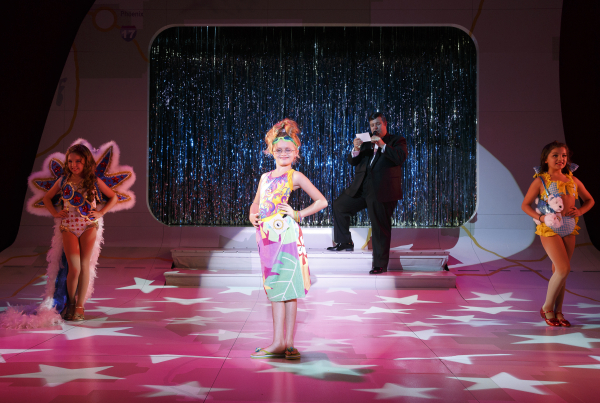Little Miss Sunshine

(© Joan Marcus)
In the midst of Little Miss Sunshine, William Finn and James Lapine’s new musical at Second Stage Theatre, there is a song called “Something Better Better Happen.” This haunting ballad, one of the most beautiful Finn has ever written, expresses a mother’s frustration at how nothing has yet gone right. Far too often does this quiet, heartbreaking prayer for a miracle extend beyond the proscenium and into the house.
Based on the brilliant 2006 film of the same name, Little Miss Sunshine seems perfectly suited for the stage treatment, filled to the brim with quirky characters screaming to sing and emotional situations ripe for gut-punching tunes. As evidenced by their collaborations on the Tony-winning musicals Falsettos and The 25th Annual Putnam County Spelling Bee, Finn and Lapine make the ideal writing team for adapting this material. That the end product of Little Miss Sunshine is so frustratingly hit or miss, mostly miss, is one of the biggest heartbreakers in recent memory.
Little Miss Sunshine follows the wayward Hoover family as they journey in a broken down VW bus from their Albuquerque home to a children’s beauty pageant in Redondo Beach, California, where little daughter, Olive (Hannah Nordberg), has unexpectedly been invited to compete. Despite initial misgivings, the family members, led by parents Richard and Sheryl (Will Swenson and Stephanie J. Block), pile into the vehicle. Among them are their sullen teenage son, Dwayne (Logan Rowland), Richard’s addiction-prone father (David Rasche), and Sheryl’s lovelorn brother Frank (Rory O’Malley). Frank is a Proust scholar who attempted suicide after getting dumped by his boyfriend, and Richard’s father was booted from his retirement community because of his penchant for sex and cocaine.
This-already-fractured family in search of the American dream quickly becomes even more fractured than the VW, which breaks down almost as soon as they hit the road and requires consistent pushes to get going. With the inventive help of choreographer Michelle Lynch and a bunch of rolly chairs, Lapine manages to replicate this image, indelibly performed on screen, in an impressively theatrical fashion. In fact, for a piece set mostly inside that vehicle, Lapine’s staging rightly recognizes the necessity to open the material up and let it breathe.
The biggest problem, just as it was at the La Jolla Playhouse where a different version by the same team played in 2011, is that neither Lapine nor Finn seem completely certain that this tale needs to be a musical. In terms of the score, Finn provides a lot of sung dialogue, but very few genuine songs (each actor gets a big one, some of which are quite affecting). Book-wise, Lapine’s adaptation of Michael Arndt’s Oscar-winning screenplay is more verbatim than original, following the film nearly plot point by plot point. And while the cast tries their hardest to make the roles their own, they are encumbered by memories of the screen stars, Greg Kinnear, Toni Collette, Steve Carell, and the great Alan Arkin, who won an Academy Award for his performance as Grandpa.
Swenson and Block are both sort of miscast but making the most of it, with game faces on (O’Malley, too, maintains his game face, even though his role, so important on film, has become a throwaway). Each is given a pretty number in which to shine, and Block, in particular, stirs the soul with the aforementioned “Something Better Better Happen.” Rasche is a hoot as Grandpa, though he’s saddled with a ridiculous outfit (costumes are by Jennifer Caprio) and a head scratcher of a song about the joys of fornicating.
The real star here is Nordberg, making her New York theatrical debut as Olive in what could be one of the big splashes of the season. This big-hearted nine-year-old with blonde hair and a thoroughly enchanting personality is not only endearing, but magnetic. She brings such a striking originality to the role that you can’t help but wish the rest of the production did the same.











